Hi Everyone,
With 31 rescues attended in June it was a lot quieter than the previous month’s 52 rescues. I’m convinced the cold snap which showed up mid-month had much to do with this. During that whole week everything seemed to stop. The Gold Coast became the ‘Cold Coast’ causing everyone to add extra layers of clothing before things returned to normal.
Our ‘favourite bird’ had quite a good month for a change with only 3 ibis needing to be caught. That might be an all-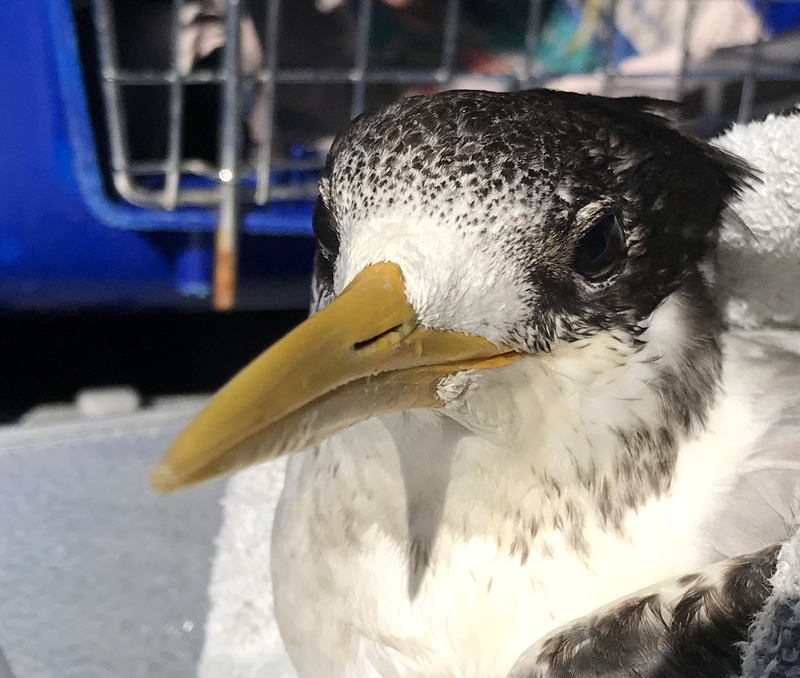 time low. Same for the pelis, although 3 per month is about normal for them. Sadly the swans took the brunt of it again with 8 having to be rescued in June. Gulls also took a bit of a hammering with 6 needing rescue, that’s if I throw in one tern which is close enough to a gull to make it eligible.
time low. Same for the pelis, although 3 per month is about normal for them. Sadly the swans took the brunt of it again with 8 having to be rescued in June. Gulls also took a bit of a hammering with 6 needing rescue, that’s if I throw in one tern which is close enough to a gull to make it eligible.
The tern (at right) was a funny little fellow. Not sure what was wrong but he was easily caught which should never happen. They’re pretty birds. In fact two weeks after his rescue I was in the ‘water birds’ enclosure at Currumbin Wildlife Hospital when who should come running over. Doubt it was to say … ‘hi Rowley, thanks for rescuing me’. More likely he hoped I was carrying fish. Vet nurse Natasha said he was doing well, just young and would be released once he’d put on some weight.
Never Climb into a Stranger’s Boat
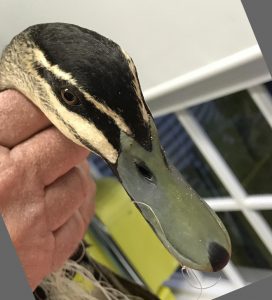 I suspect the duck at left was hooked after someone left fishing lines unattended on a canal side dock in Clear Island Waters. It’s the same old story. Poor thing probably took a bait … panicked, then tried to get away … broke the line and swam off with a hook in its tongue; a painful, life threatening injury. The fisher would have turned up sometime later, saw the ‘break off’ and thought … ‘Oh crap, just lost a beaudy!’
I suspect the duck at left was hooked after someone left fishing lines unattended on a canal side dock in Clear Island Waters. It’s the same old story. Poor thing probably took a bait … panicked, then tried to get away … broke the line and swam off with a hook in its tongue; a painful, life threatening injury. The fisher would have turned up sometime later, saw the ‘break off’ and thought … ‘Oh crap, just lost a beaudy!’
Yeah right, Dorko; you didn’t lose a fish, instead you caused immense suffering, plus a great deal of work for others and as much as a thousand dollars in veterinary expenses, rehab and transport. I’ve often said that if we could present those fishers who are responsible for being irresponsible with a bill then the practice of ‘setting and forgetting’ their lines would end overnight.
However, that’s not likely to happen because, believe it or not, it’s perfectly legal for fishers in Qld to cast out up to 6 lines each (6 lines each … WTF!). It’s common to see 2 or 3 lines set from a dock, the fisher having walked away sometimes not checking those lines for hours, or even days and with complete disregard for waterbirds swimming all around.
Fortunately there was a funny side to this rescue. The caller was a lovely bloke and keen to help. The bird had already left the foreshore and so he’d headed out in his boat to try to find it. Didn’t have to go far … it was next door. When I arrived the skipper was already ‘three sheets to the wind’ and had more ‘refreshments’ on the floor next to his seat. He insisted that I climb aboard so that we could inspect the duck’s location from the water. Not a long trip … just next door. Off we went. Duck inspected; plans laid, he piloted the boat back to his dock.
You know what it’s like when you’re the passenger in a car and the driver can’t park? They go in and out but just can’t manage to manoeuvre the damn thing against the kerb. Out again; in again … oh my God.
I know boats. I live on one and I own three (if you count the dinghies). So there I was, captive to multiple failed docking attempts each of which added to my rapidly rising levels of frustration plus a sinking feeling (sorry) that I might never set foot on land again. If it took any longer the bird could die of starvation. Finally we docked and I was able to climb ashore, very relieved.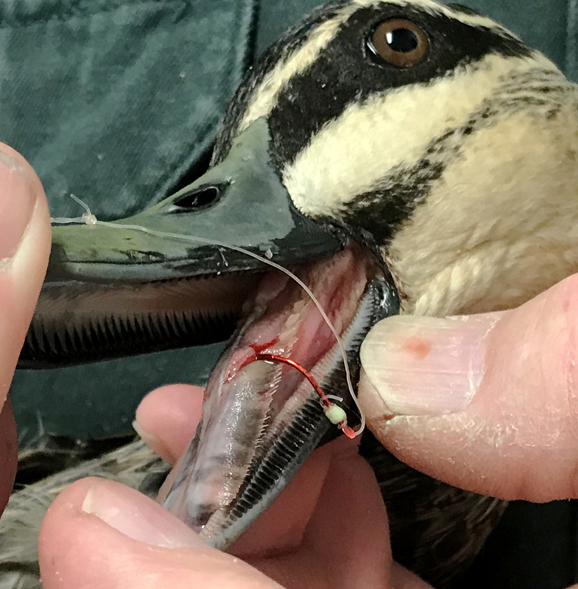
Turns out the occupant next door was a fisher who regularly left lines out unattended. When I told him about the duck he was very helpful and led me through his home and onto the foreshore. After I’d secured the creature he was keen to see if the hook in its mouth was the same variety that he used. It wasn’t, which was a relief for him but also a very good lesson. Having seen firsthand the distress that unattended lines can cause he swore to never leave them out again.
I wasn’t finished. Marching up the street with the duck in hand I banged on a door, several along, where I could see another canal side dock streaming with unattended fishing lines. When the occupant opened the door I pointed to the bird’s tongue and told him of the carnage that walking away from fishing lines can cause. For emphasis I mentioned the ‘high cost’ of repairs. The guy was an overseas student and a tad short on English. Of course he was never actually going to get a bill for said repairs but I hoped the idea that he ‘might’ would do the trick.
My Worst Nightmare
Who likes enclosed spaces? Crickey, I feel claustrophobic in an elevator. The thought of those kids in Thailand trapped for days in a cave not knowing whether they’d ever see the light of day again made me shiver.
I’d rescued Lucy after she’d crawled up into a callers front garden and just plonked herself down, barely moving. I couldn’t see any injuries but clearly she was not well. The caller thought she was the female of the swan family floating out front on the lake. Dad was there with the 4 kids but no mum. Lucy needed to go to hospital.
Fast forward a month. The hospital pronounced Lucy ‘good to go’. I asked Doug and Michael on the ambo to bring her up to Coombabah and at the same time I’d transfer another swan which Id’ just caught into their vehicle. Upon arrival we walked Lucy down to the lake and released her. It had transpired that she wasn’t the missing female of the resident family. That bird had turned up back on the lake a day after I’d caught Lucy.
As we stood on the shore I could see that pair of swans with their kids off in the distance. Swans with cygnets are very territorial and I knew they probably wouldn’t take kindly to Lucy being back in their territory. But it was a big lake and the family was at least half kilometre away … plenty of room and plenty of time for her to get airborne if need be.
Upon release Lucy took to the air immediately. She flew well landing on the other side of the lake but out of sight from where I was standing. I headed into the callers house to give them the good news that she’d survived and was back home. Ten minutes later, as I emerged, an adjacent neighbour said there’d been a big fight. I could see the male from the family all puffed up and patrolling just meters offshore. Turns out he’d seen Lucy then flown over and got stuck into her. Instead of taking to the air she’d tried to out swim him. Big mistake. He’d chased her, biting at her tail feathers all the way around the perimeter of the lake and back to where I was standing. Here’s the scary part. Lucy, in a desperate attempt to escape, had squeezed into an open storm water pipe on the lake’s edge and run right up it and was now out of sight. Oh shit!
Memories flooded back to a time three years early when I was called to rescue a swan at that same lake. By pure chance a homeowner had walked out to her car on the road behind the lake. While opening the boot she’d heard a faint squeaking noise behind her. It seemed to be coming from a roadside grate. She walked over and peered in. There, looking up at her from the bottom of the drain under the grate was a forlorn little swan. Who knows how long he’d been lost in the maze of stormwater pipes which surround the lake. What I can say is that he looked pretty darn relieved after I lifted the grate, lowered a net a full two meters down, then fished him out.
Now it was Lucy who was lost in the pipes. Using a powerful torch I hoped to spot her but it was hopeless. I could see eight meters up the pipe to where it branched in several different directions. There was nothing more I could do. I just had to hope she’d find her way out. I felt sick.
As the old saying goes, all’s well that ends well. Three days later she was found sitting in someone’s garden. Obviously she’d managed to navigate the stormwater system and was now taking refuge (again) up on land. Phewww doesn’t begin to describe my relief. So, it was off to hospital for another short stay. This time I arranged for Lucy to be released on an adjacent lake system, away from her tormentor.
When Evil Stalks the Land
The look on Kate’s face says it all. She’s just been told the swan I’ve handed her is Rastas ‘the Terrible’; tormentor of elderly ladies, nemesis of paddle boarders and general bringer of mayhem. That pretty much sums up Rastas’s recent activities. No wonder Katie looks worried!
Rastas had been terrorising the residents living along ‘his’ canal in Carrara for several weeks. It’s most unusual for a swan to behave aggressively towards people unless the bird is protecting young. But Rastas’s story was a little different. According to reports he used to be a very sweet bird. He and his partner had lived in the tiny canal for some years. Then she died. Ever since then Rastas had been taking out his grief and loneliness on all who ventured near the water’s edge. The residents were scared. There was talk of vigilante action. I’d already fielded a number of calls but managed to convince people to wait it out. ‘Things will get better’, I said. Famous last words. Then he attacked a paddle boarder, knocking the woman into the water and chasing and nipping at her as she swam frantically for the shore. Shades of Lord of the Rings. Poor thing must have thought ‘the Nine were abroad’ and ‘one of the Nazgul was upon her’. That was the final straw.
I have to admit to some trepidation as I approached Rastas’s canal for the first time wondering what the hell I was going to find.
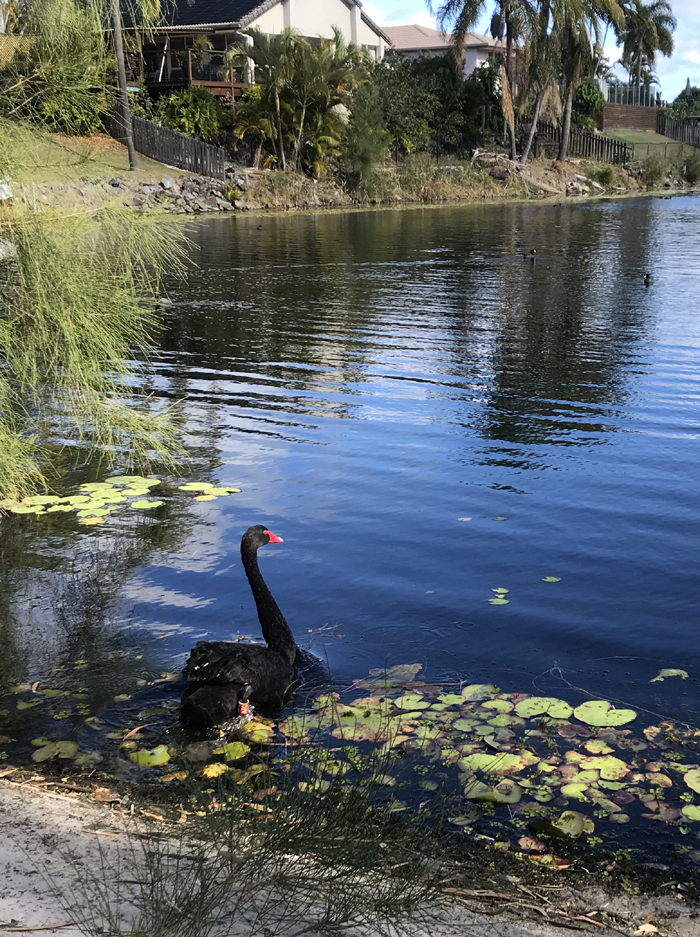 Rastas spotted me and made a bee line in my direction. Hauling out of the water in front of me he marched up the beach, all fluffed up and full of confidence. Having successfully bullied everyone else he probably wasn’t ready for what happened next. I reached forward and grabbed him by the scruff of the neck, then slung him up under my arm before giving him a good telling off.
Rastas spotted me and made a bee line in my direction. Hauling out of the water in front of me he marched up the beach, all fluffed up and full of confidence. Having successfully bullied everyone else he probably wasn’t ready for what happened next. I reached forward and grabbed him by the scruff of the neck, then slung him up under my arm before giving him a good telling off.
I’d already had a word about Rastas to Mic Pyne (head vet at CWH). We were trying to figure out what to do with him. My initial plan had been to drop him in an adjacent waterway, however that could be dodgy. I might just be transferring the problem to somewhere else. So it was agreed that I’d take him to hospital where Mic would check him for anything unusual (like horns sprouting from the top of his head). He’d be held for a while so that staff could observe his behaviour. If all went well I’d release him.
In hospital Rastas was a bit cranky towards the other swans in the waterbirds area. That’s a the nice way of saying that he attacked all of them. However, he was good with the staff and never displayed aggressive behaviour. This was important. After two days he’d settled down and made friends with Delilah, an elderly swan which I’d had in hospital for some time. Things were looking good. I saw no reason to hold him any longer and was confident that he could integrate with other swans if given the chance. He was released on Westlake, Robina. I just hoped he wouldn’t fly home.
It was two days before I heard from the residents of Carrara. Rastas was back and up to mischief again. Rats!
I drove to the canal and caught Rastas before giving him another telling off. He’s the perkiest, most intelligent swan I’ve ever seen. He really is a lovely creature … just a bit naughty. So, it was back to Westlake.
This time it only took him a day to fly home.
I went to catch him for a third time, although by now he was wary, patrolling up and down the canal glaring at me from 5 meters away, challenging me to get my hands on him. Ha, you’re kiddin’ aren’t you Rasty? Two minutes later he was securely under my arm as I carried him to the car while delivering my sternest lecture yet.
I plonked him back in Westlake (at left). He flew home in two hours. #@$$!!!
We were running out of options. We couldn’t allow him to stay home in ‘his’ canal. The fact is he did present some threat to residents. Not serious, but it was possible he might set upon a child and that we couldn’t risk. Wayward native creatures like this can face euthanasia. Release is not even an option for an aggressive roo. They get bumped off immediately. We’d been able to established that Rastas’s aggressive behaviour appeared to be specific to ‘his’ canal; a mere 100 meter long narrow waterway where he had ‘history’ and which he patrolled relentlessly. Elsewhere he appeared to be fine.
I looked for places in the Logan area where we might relocate him, although 40 k’s away probably wasn’t far enough. So far he’d demonstrated all the skills of a homing pigeon. I looked further north. After taking advice from Jo at RSPCA we settled on a lake system about 30k’s north of Brisbane. The area has plenty of resident swans and is more than 100k’s from the Goldie. Hopefully he’ll fit in and maybe find himself a new partner. That, I’m sure, would solve all problems.
Currently we’re waiting on approval from authorities as all translocations are subject to strict rules.
Throw Away your Prozac
Dealing with all these bird matters can be stressful. It can leave a bloke feeling down at times what with all that death and destruction, not to mention the swan poo. But there’s good news. I’ve found the ultimate cure for the ‘blues’. No need for any of those drugs that doctors dish out like candy these days. I’ve discovered a natural product which I’m convinced is far more effective. It’s called a Mille Feuille. That’s them at right. Look pretty damn good eh? Don’t ask me how to pronounce the name. Nor do I recommend standing at the counter struggling to order your Milly Vanilly while fellow cake eaters in the queue behind snicker at your pronunciation. The best idea is to just point at what looks every bit like a good old vanilla bloody slice and tell ’em that’s the one you want. You will pay a premium but it’s worth it.
convinced is far more effective. It’s called a Mille Feuille. That’s them at right. Look pretty damn good eh? Don’t ask me how to pronounce the name. Nor do I recommend standing at the counter struggling to order your Milly Vanilly while fellow cake eaters in the queue behind snicker at your pronunciation. The best idea is to just point at what looks every bit like a good old vanilla bloody slice and tell ’em that’s the one you want. You will pay a premium but it’s worth it.
It gets better. When using Mille Feuilles for therapeutic purposes the same principals apply as for any pharmaceutical product. It’s important to follow dosages closely. For example … never skip a dose (I like that advice). Take your Mille Feuille daily (I like that even more). In fact for best results take it twice daily for at least one month and possibly for the rest of your life (could it get any better?).
The only downside I can see is diabetes which seems a very small price to pay for such enjoyment.
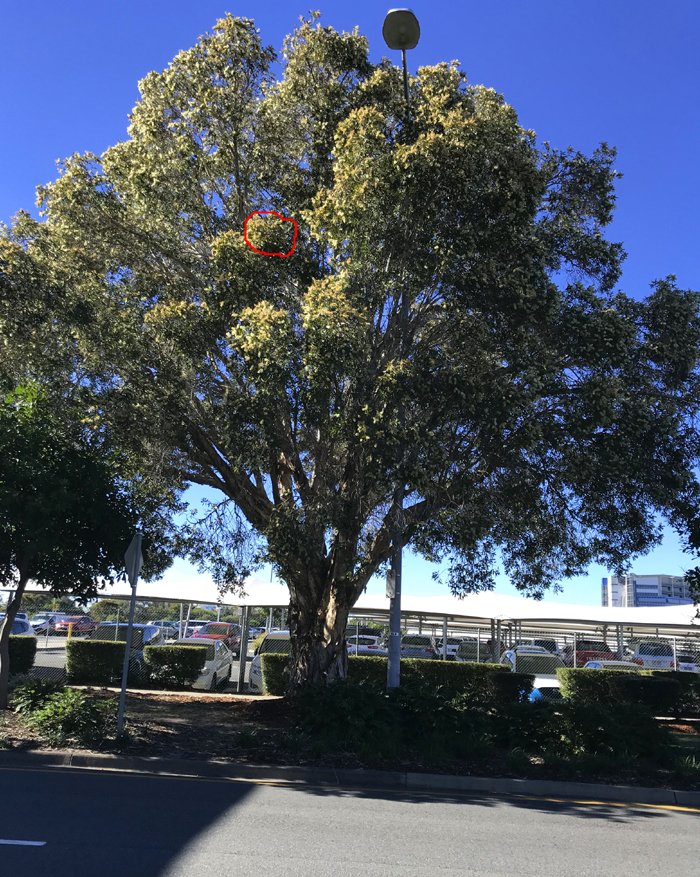 The Sad File
The Sad File
Two of the three ibis caught in June were not in good shape. One little fellow had lost two thirds of his beak. Not much more than a stump left near his face (I’ll spare you the pic). Must have been terribly painful. Possibly a car strike but more likely he’d stuck his long beak into a tight crevice or similar and broken it off as he jerked it out. We’ll never know. I caught him and he was quickly dispatched. No more suffering.
Another unfortunate little chap was found hanging upside down from fishing line wound around his leg and caught in the branches of a tree (red circle in pics at left and right).
The trick to getting an entangled bird down out of a tree is … No1 … 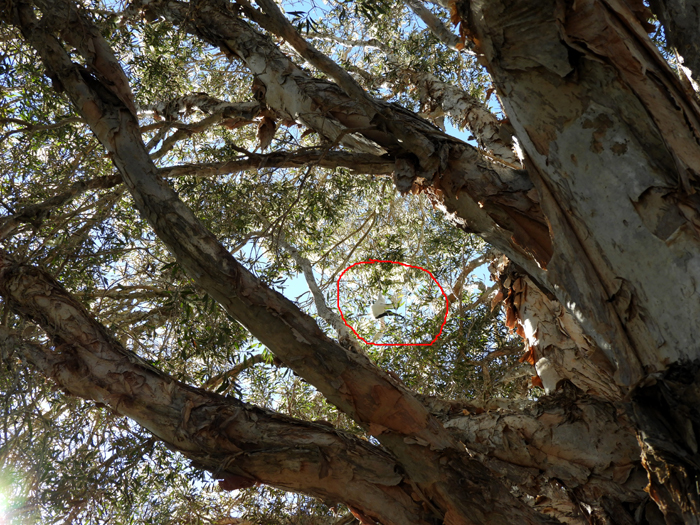 don’t cut the line. If you do that the bird will fly off immediately with the damaging entanglement of fishing line still around its leg.
don’t cut the line. If you do that the bird will fly off immediately with the damaging entanglement of fishing line still around its leg.
I sized up the situation noting the length and approximate weight of the branch the bird was attached to. Sliding the long extension pole up 6 meters to that branch I sawed through a section; the idea being to bring the bird down attached to a enough wood that it can’t get airborne. That branch mustn’t be too heavy or you could break the bird’s legs in the fall.
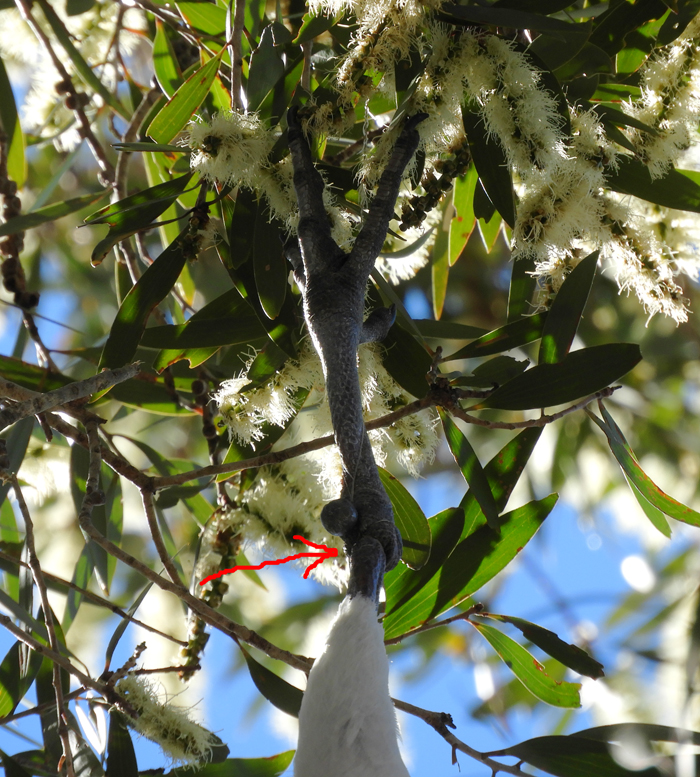 The tree was right up against Terminal Drive which leads into Gold Coast Airport. Lots of traffic. If I got it wrong the bird could plummet down and land among the speeding cars. That would be messy, not to mention the liability. Luckily I judged the weight correctly and the little bloke hit the deck right at my feet (below right)
The tree was right up against Terminal Drive which leads into Gold Coast Airport. Lots of traffic. If I got it wrong the bird could plummet down and land among the speeding cars. That would be messy, not to mention the liability. Luckily I judged the weight correctly and the little bloke hit the deck right at my feet (below right)
Observing him earlier through binoculars I could see the wrap of fishing line holding the creature in the tree had cut deeply into its leg (arrow at left). On close inspection my worst fears were confirmed. There was a hook and a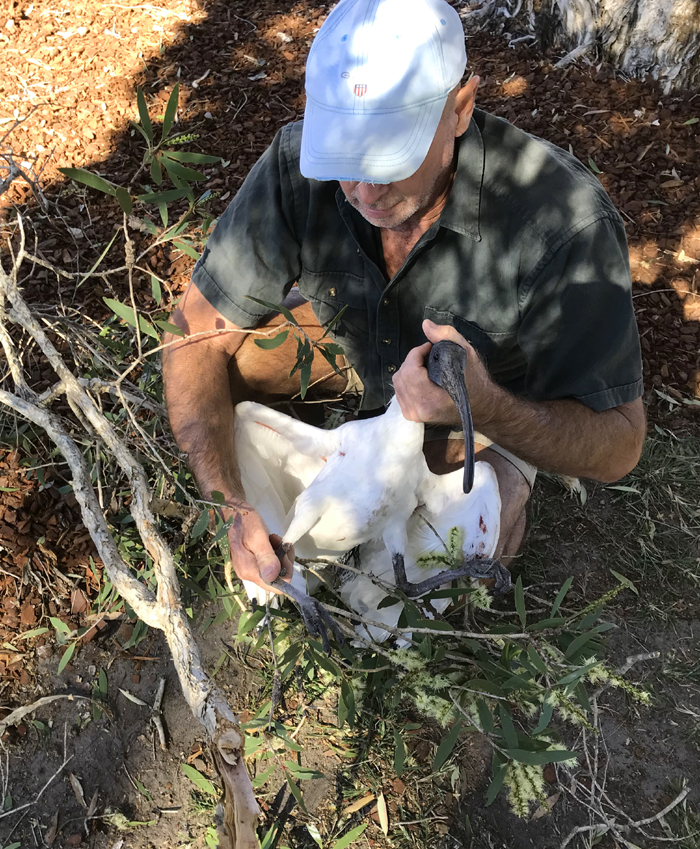 sinker but weren’t so bad. However, the wrap of line had severed the tendons in the poor thing’s leg. This bird would never use that foot again.
sinker but weren’t so bad. However, the wrap of line had severed the tendons in the poor thing’s leg. This bird would never use that foot again.
What a crap result. Nothing further could be done to help him. An ibis that can’t forage will slowly starve. Sadly he went the way of the previous bird. At least neither are out there suffering.
We’re in Good Shape
A special thanks to everyone who made a donation following my request for help in the last weeks of June. Lots of people helped out including many regular donors and quite a few new. Thank you very much to all. Every donation helps and just as I’d hoped, it means that Wild Bird Rescues will move forward with a few bob in the bank to help cover the usual expenses, especially car, phone and equipment. WBR is a very efficient and inexpensive operation to run, especially compared to the bigger outfits. Despite the small budget we help more than 500 sick or injured birds every year, catering especially to birds that present the greatest challenge to catch. That’s where we shine.
Bro, You’ve Got it Arse About
Speaking of donations, here’s a creative twist on the norm.
I’d been called to rescue a hooked waterbird by the groundsman at a (very large) church. In fact I’d gone to that church several times in the past when they’d asked me to help other injured birds. This time it was a water hen entangled in fishing line and with a very nasty lure hooked in its leg.
I managed to catch the creature quickly, disentangle it and relieve it of the lure. Fortunately the bird hadn’t sustained any serious damage and so I released it immediately. Bearing in mind that Wild Bird Rescues is a volunteer outfit with all time and effort supplied for free, I was more than a little surprised when, having completed the rescue, the gentleman actually asked me for a donation. I know the Lord moves in mysterious ways but this was just too mysterious. After politely declining his request and gathering my senses I knew what to do. I was going to have to up my dose of Mille Feuilles.
Thanks again to all who support Wild Bird Rescues. There’s been some epic saves lately including the 6 beak entangled darter caught over the past couple of months, plus countless other birds which would have died or still been out there suffering if WBR wasn’t on the job and if you weren’t making it possible.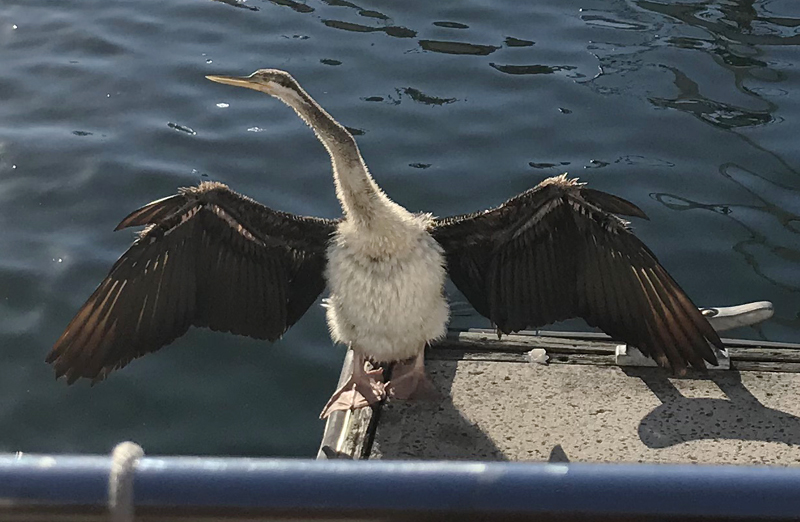
This little lady at right climbed out onto the dock alongside of me this morning to dry her wings. She was less than 3 meters away. How come whenever I need to catch a darter I can’t get anywhere near them, yet any other time they practically sit on my lap?
Until next time
Rowley
‘El Presidente for Life’
Wild Bird Rescues GOLD COAST